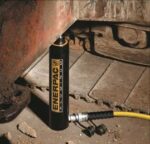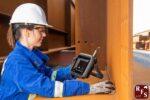Go-anywhere cylinders offer extraordinary power-to-weight
Global advanced industrial tools and services leader, Enerpac, is extending the versatility of its RAC-Series lightweight aluminium cylinder range, with new 10t and 15t models for smaller lifts requiring outstanding portability and power-to-weight ratios. The cylinders, with strokes from 50-250mm, weigh from just 1.3-2.0kg for the new 10-ton models and 1.9-2.9kg for the new 15-ton models, through to a maximum of 41.3 kg for the range-topping 150-ton models. “The new 10t and 15t models, which further extend the range, are particularly useful for maintenance tasks, and in situations where they need to be moved from job to job,” says Enerpac Asia-Pacific Marketing Manager, Mr Tony Cooper. The RAC-Series has been proven globally for years on lifts between 20 and 150 tonnes, where it provides the same lifting performance and safety in half the weight of equivalent steel hydraulic cylinders. Frequently used in workshops, fabrication and manufacturing applications, Enerpac’s range of RAC single-acting, spring return aluminium cylinders are one of the most widely used ranges in Australasia. “Cylinders often need to be carried for field maintenance, elevated platform work, up stairs or across processing plants. The light weight and outstanding portability of the RAC-Series cylinders are highly valuable in these situations, especially on remote sites, where they may need to be carried in by air or 4wd,” says Mr Cooper. The aluminium versions are also perfect for mounting on machines or applications where the weight of the hydraulic components is important. Because of their weight, aluminium hydraulic components can be more easily moved or removed for maintenance and repair. Their non-magnetic properties can also be useful in uses around high technology, equipment and magnetically or electronically sensitive instruments and applications in resources, processing and exploration. “Additionally, because it is non-corrosive by design, aluminium has always been a good material for use […]










